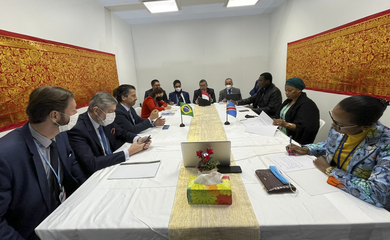Minister: Livestock plays a key role in the global climate agenda

The minister of Agriculture, Livestock and Supply, Tereza Cristina, said today (30), at the opening of the Planeta Campo Forum, organized by Canal Rural, that the debates at the United Nations Conference on Climate Change in 2021, COP26, in Glasgow , in Scotland, were important to show that our livestock has a fundamental role in the national and global climate agenda. According to her, agriculture is part of the solution to the problem and should be seen in this way by anyone wishing to reduce the impacts of global warming.

"The Brazilian team presented the world with solutions that we have already adopted and surprised them, because few countries have projects to reduce emissions in our sector. We showed the ABC Plan, the ABC+ Plan, which has consolidated itself as a great strategy for the agricultural sector in the area of assistance from the Brazilian NBC. Half of Brazilian emissions come from deforestation. There is a challenge in building the forest economy and valuing its ecosystem and environmental services in the context of rural properties."
According to the minister, Brazil left COP26 with the commitment to eliminate illegal deforestation by 2030, even anticipating this goal to 2028, in addition to signing the commitment to reduce methane emissions, which brings challenges to the country, but brings opportunities. "Brazil must overcome a set of obstacles, including the challenge of credit, the training of technicians in this area and the transfer of technologies already available to the sector, in order to fulfill its climate commitments," he stated.
Tereza Cristina highlighted that the unprecedented mention in the final document of COP 26 on the reduction of fossil energy sources should intensify the use of renewable energy in production chains. "The agricultural sector has a relevant role in this issue. With the relevant potential for the production of agrivoltaic energy, biomethane, biodiesel, ethanol, damage and loss financing and commitment to coal were issues whose results were far below expectations."
Legislation
The minister also highlighted that, in Brazil, environmental legislation is one of the strictest in the world and the rural producer is the country's largest environmentalist, as Brazil preserves 66% of the native vegetation to date and 25% is within the properties of the farmers. She added that it is past time to resolve payment for environmental services and that we have to resolve the problem of illegal deforestation, which should be nil in Brazil.
"So, I see these commitments as an opportunity for Brazilian agribusiness. We have expertise in measures to reduce emissions and we can collaborate with other countries in this necessary transfer of technology," he said.
Carbon footprint
Environment Minister Joaquim Leite stated that the climate conference is a showcase for Brazil in terms of environmental policies, sustainable agriculture, and that at COP26 the country had the opportunity to hold a different conference, with the possibility to show your projects to the world.
"This was extremely important, in addition to the negotiations that took place with the strategy of creating a carbon market that brings resources for sustainable projects and that agriculture will definitely be part of this market. This market that brings a ton of equivalent carbon to be traded on the market by the Brazilian government. We achieved a consensus and we celebrate a lot".
According to him, this ton of carbon will be present in the product made by the farmer, which means that when producing a ton of soy, for example, it will be possible to measure the amount of carbon. At the same it will be possible to measure the carbon in native vegetation.
"We will have an agricultural product in this new world in which there is talk of the carbon footprint with the agricultural product with a differential, much better and positive in some cases. In the near future, we will be absorbing carbon during the grain production process, for example, in handling of a livestock pasture", he reinforced.
Agreement
Leite also stated that Brazil also signed an agreement to contribute, together with 104 other countries, to a 30% reduction in methane. "Brazil's contribution is already in national policies and therefore the effort is very low. Remembering that countries that have no policy at all have to make a lot of effort to adhere to the agreement and contribute> Brazil already carries out this activity and it is very important to let it of course, cattle raising already has a direction to be more efficient".
The minister assessed that the demonstration of a real Brazil during COP26 contributed to the world seeing the country in a different way, showing that the rural producer takes care of the forest. "So Brazil is responsible for protecting an area of 228 million hectares in rural property alone. In other words, 66% of the national territory is protected with native forest and this is a competitive advantage for Brazil."
Text translated using artificial intelligence.




